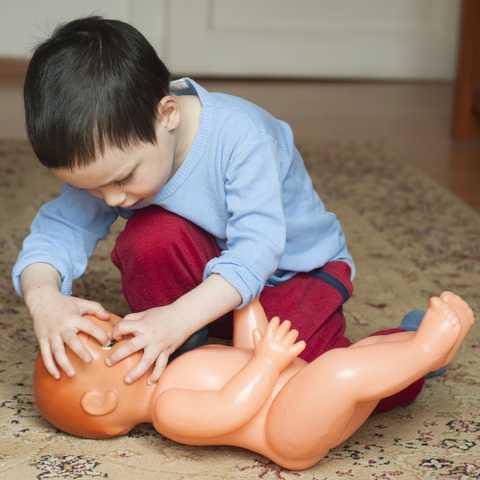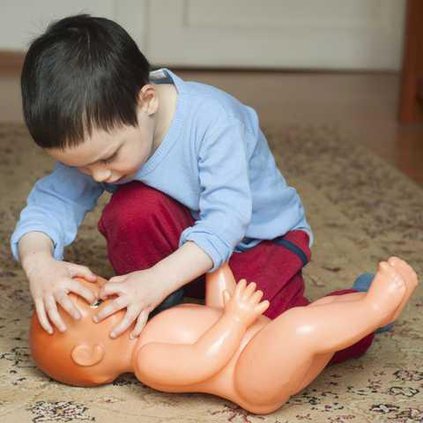There's been a huge uproar about the gendering of toys lately. For example, Target decided to stop segregating toys into boy and girl sections, and many people feel this is the first step towards doing away with all types of gender differentiation including separating bathrooms and clothing sections.
However, maybe toys rest in a different category than clothing and restrooms. Their functions are different, so maybe they should be separated by function instead of by gender. According to the Let Toys Be Toys campaign, "Toys are for fun, for learning, for stoking imagination and encouraging creativity. Children should feel free to play with the toys that most interest them. Isnt it time that shops stopped limiting our childrens imagination by telling them what they ought to play with?"
In the past, society has taught us it's socially unacceptable to cross gender lines with regards to toys, especially for boys. However, there are some valuable benefits to allowing your son to play with "girl toys."
Here are 8 reasons you should encourage your boys to play with dolls.
1. Dolls don't make him gay
For some reason, many parents fear that allowing their son to play with certain toys will turn him gay. However, toy makers don't plant a gay virus into all pink toys. In fact, they don't infect a single toy with a gay virus because it doesn't exist. Your son will not "catch gay" from anything even if he's dressing up in an Elsa costume or playing with an Elsa doll.
2. Playing with dolls teaches him to value femininity
Some parents are worried that allowing their sons to play with dolls will make them targets for teasing or bullying. While this is a possibility, the real concern with bullying lies more with the bullies than with the victims.
Kids may make fun of your son for playing with a "girl toy," suggesting there's something wrong with girls' toys and reflecting an assumption that anything feminine is less valuable. For example, calling a boy a "sissy" for playing with a doll is essentially saying that femininity is weak.
While no one wants their kids to be subjected to hateful bigotry from their peers, the issue isn't with the stimulus (a boy playing with a doll) as much as it is with the way the bullies are reflecting objectionable societal beliefs that devalue women.
3. Playing with dolls prepares him to be a dad
In this day and age, don't we believe in fatherhood? Is it just mothers who care for their children? No. We believe fathers are just as important as mothers. Therefore, it only follows that future fathers have just as much right and need to play with baby dolls as future mothers.
When kids play with dolls, they practice feeding, comforting and all around caring for their baby doll, emulating how they see adults care for children and practicing for the future.
4. Girls can play with "boy toys"
No one bats an eye at a girl playing with a blue doctor's kit or building a tower from "boy" Legos. So why is it not the same for boys? Allowing girls to play with boy toys but not allowing boys to play with girl toys sends a damaging message to both genders that the feminine is less valuable.
5. Playing with dolls resists unhealthy male stereotypes
The stereotypical view of masculinity propagated by the media and gendered toys is someone aggressive and destructive. Is Chuck Norris or a Power Ranger the person we hope our sons aspire to become? It's terrifying to think that beating people up, shooting humans to death or exploding buildings is the ideal of masculinity.
Dolls give boys the opportunity to explore attributes besides aggression and learn crucial life skills. Through playing with dolls, boys can practice nurturing and learn how to communicate with others.
6. Buying dolls for boys resists marketing strategies
Toys do not inherently have a gender. In fact, in the past, there were far fewer distinctions between what boys should play with and what girls should play with. Toys were just play things for children.
However, in the last 50 years an increase in the separation of toys based on gender has been generated by marketers (not toy developers). So by choosing to give your son a doll in spite of advertising, you are making a conscious decision rather than being a consumer of whatever marketers are dishing out.
7. Playing with dolls prepares him for a younger sibling
Giving your son a doll to help him understand your family is going to be welcoming a baby sibling into the circle can be effective. It shows him some things to expect and is a great resource for teaching him how to hold his new baby brother or sister.
8. Playing with dolls helps develop fine motor skills
Studies show dolls are a great way for children to develop fine motor skills. Actions such as putting a bottle in the baby's mouth, dressing and undressing and wrapping the baby in a blanket all require a certain amount of practice for children learning to use their hands and bodies.
9. Playing with dolls helps him become a more open-minded adult
Teaching your son to resist gender stereotypes as a child will help him to be a more accepting adult. It shows him the status quo isn't always correct and leaves his mind open to see alternative points of view.
However, maybe toys rest in a different category than clothing and restrooms. Their functions are different, so maybe they should be separated by function instead of by gender. According to the Let Toys Be Toys campaign, "Toys are for fun, for learning, for stoking imagination and encouraging creativity. Children should feel free to play with the toys that most interest them. Isnt it time that shops stopped limiting our childrens imagination by telling them what they ought to play with?"
In the past, society has taught us it's socially unacceptable to cross gender lines with regards to toys, especially for boys. However, there are some valuable benefits to allowing your son to play with "girl toys."
Here are 8 reasons you should encourage your boys to play with dolls.
1. Dolls don't make him gay
For some reason, many parents fear that allowing their son to play with certain toys will turn him gay. However, toy makers don't plant a gay virus into all pink toys. In fact, they don't infect a single toy with a gay virus because it doesn't exist. Your son will not "catch gay" from anything even if he's dressing up in an Elsa costume or playing with an Elsa doll.
2. Playing with dolls teaches him to value femininity
Some parents are worried that allowing their sons to play with dolls will make them targets for teasing or bullying. While this is a possibility, the real concern with bullying lies more with the bullies than with the victims.
Kids may make fun of your son for playing with a "girl toy," suggesting there's something wrong with girls' toys and reflecting an assumption that anything feminine is less valuable. For example, calling a boy a "sissy" for playing with a doll is essentially saying that femininity is weak.
While no one wants their kids to be subjected to hateful bigotry from their peers, the issue isn't with the stimulus (a boy playing with a doll) as much as it is with the way the bullies are reflecting objectionable societal beliefs that devalue women.
3. Playing with dolls prepares him to be a dad
In this day and age, don't we believe in fatherhood? Is it just mothers who care for their children? No. We believe fathers are just as important as mothers. Therefore, it only follows that future fathers have just as much right and need to play with baby dolls as future mothers.
When kids play with dolls, they practice feeding, comforting and all around caring for their baby doll, emulating how they see adults care for children and practicing for the future.
4. Girls can play with "boy toys"
No one bats an eye at a girl playing with a blue doctor's kit or building a tower from "boy" Legos. So why is it not the same for boys? Allowing girls to play with boy toys but not allowing boys to play with girl toys sends a damaging message to both genders that the feminine is less valuable.
5. Playing with dolls resists unhealthy male stereotypes
The stereotypical view of masculinity propagated by the media and gendered toys is someone aggressive and destructive. Is Chuck Norris or a Power Ranger the person we hope our sons aspire to become? It's terrifying to think that beating people up, shooting humans to death or exploding buildings is the ideal of masculinity.
Dolls give boys the opportunity to explore attributes besides aggression and learn crucial life skills. Through playing with dolls, boys can practice nurturing and learn how to communicate with others.
6. Buying dolls for boys resists marketing strategies
Toys do not inherently have a gender. In fact, in the past, there were far fewer distinctions between what boys should play with and what girls should play with. Toys were just play things for children.
However, in the last 50 years an increase in the separation of toys based on gender has been generated by marketers (not toy developers). So by choosing to give your son a doll in spite of advertising, you are making a conscious decision rather than being a consumer of whatever marketers are dishing out.
7. Playing with dolls prepares him for a younger sibling
Giving your son a doll to help him understand your family is going to be welcoming a baby sibling into the circle can be effective. It shows him some things to expect and is a great resource for teaching him how to hold his new baby brother or sister.
8. Playing with dolls helps develop fine motor skills
Studies show dolls are a great way for children to develop fine motor skills. Actions such as putting a bottle in the baby's mouth, dressing and undressing and wrapping the baby in a blanket all require a certain amount of practice for children learning to use their hands and bodies.
9. Playing with dolls helps him become a more open-minded adult
Teaching your son to resist gender stereotypes as a child will help him to be a more accepting adult. It shows him the status quo isn't always correct and leaves his mind open to see alternative points of view.








